4 lead generation techniques to make your website a lead magnet
Generating continuous leads is the lifeline of a business. It is imperative to generate “quality leads” in the world of educated buyers.

According to a report from Hubspot, 63 percent of marketers say generating quality leads is the biggest challenge for them. The first thing that one needs to get found online, and build trust, is a strong lead generation process.
Here are four tactics to keep in mind for your lead generation strategies:
Email marketing
Email marketing is one of the most important, and high conversion channels to generate leads. However, many businesses are not effectively utilising this channel.
According to a Marketingprofs report, 15 percent of marketers surveyed say their company still does not regularly review email opens and clicks, and only 23 percent say they have integrated their website and emails to track what happens after a click.
A lot of businesses still use traditional email blast techniques to generate leads. These techniques are outdated and do not work in the current context. A main contributor to the growing email success rates is marketing automation.
Marketing automation tools sync up with the CRM to automatically send highly targeted and personalised emails to your website visitors.
There are plenty of marketing automation tools available in the market, however, if you don't want to invest tons of money, you can turn your wordpress website into a marketing automation machine using plugins like inboundnow or orbitr.
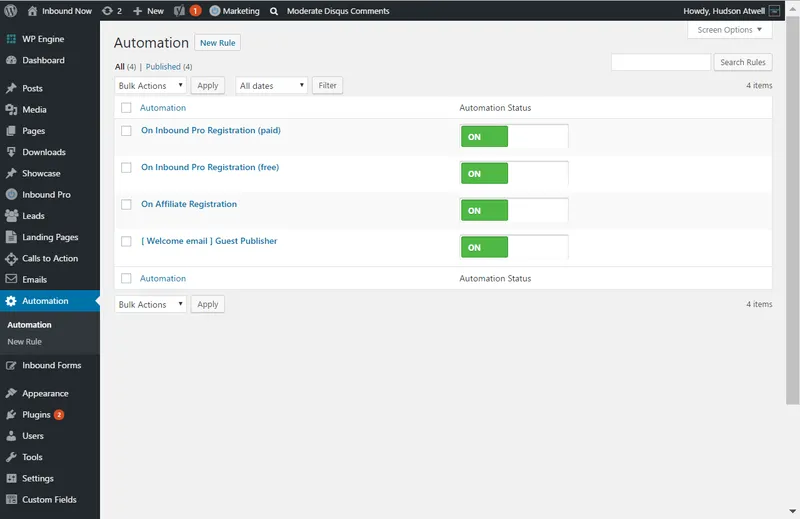
A screenshot of Inboundnow showing the marketing automation process
You can personalise your content and emails to specific customer segments that you target and can provide additional value to the reader by emailing them new ebooks or white papers that may lead them to contact your company.
You can continue to nurture your audience using workflows, triggered newsletters, and lead nurturing campaigns. The end goal of marketing automation is to convert visitors into customers.
Content marketing
Content is definitely the king and much-needed for all your marketing and lead generation efforts.
According to Demand Gen Report, 96 percent of B2B buyers want content with more input from industry thought leaders.
You can create lead magnets or offers like ebooks, templates, reports and guides that are locked so that a visitor will receive them only when their contact details are submitted in the form. B2b businesses often benefit from these, and definitely shouldn't overlook trying them out.
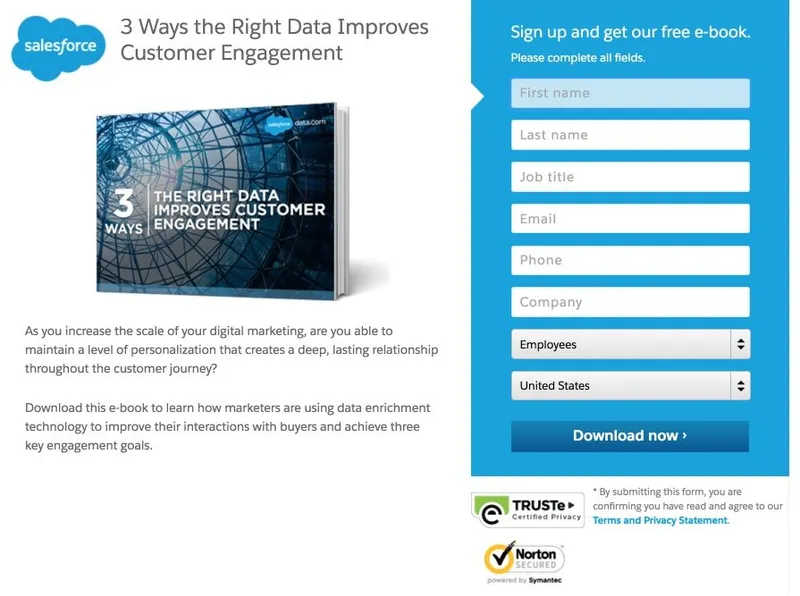
Salesforce has implemented a perfect ebook landing page with gated content to drive more leads into their funnel.
Regular blogging is also a way to be in front and center of your targeted audience. Create detailed insightful blog posts that provide thought leadership to your target audience, and answer all those questions that they're likely to ask at some point in their journey as a buyer.
You can also try video content as it is becoming more popular nowadays for viewers who don't want to read loads of text.
SEO
Search engine optimisation, and paid advertising organic search is a great way to drive new traffic to your website, which will hopefully convert into leads for the business.
Around 61 percent of marketers say improving SEO and growing organic presence is their top inbound marketing priority. You should make sure your site set up for success with a strong SEO strategy. With PPC campaigns, you would be able to drive more immediate traffic and leads.
Make sure you add relevant calls to action throughout your website content, and landing pages for paid campaigns so you encourage prospects to act right away.
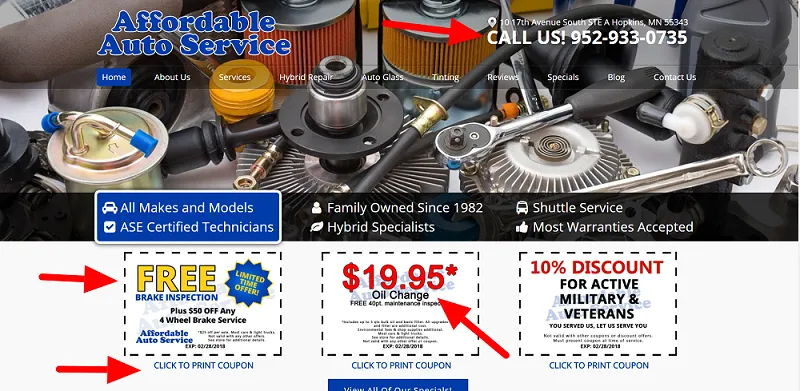

A simple car garage has incorporated multiple CTAs in their website & mobile site. An inspiration for many marketers.
SEO and paid advertising will help complement your overall strategy, helping make prospects aware of your content and offers.
Social media marketing
One of the most obvious social platforms to use for B2B lead generation is LinkedIn, that said, for any social media marketing strategy to work, you have to have a strong and unique presence.
In order to stand out from the millions of other users competing for attention, build a professional and robust profile for your business account on LinkedIn so that any B2B lead looking at your page will immediately understand what your business is and what you do.
You can also actively connect with past and present colleagues, and join relevant groups that have members who could potentially become leads for your business.
You can also use other social platforms to optimise the opportunity for lead generation. Link the social media platforms to your website, ideally to well-designed landing pages with signup forms, and use calls to action to promote your business services and products.
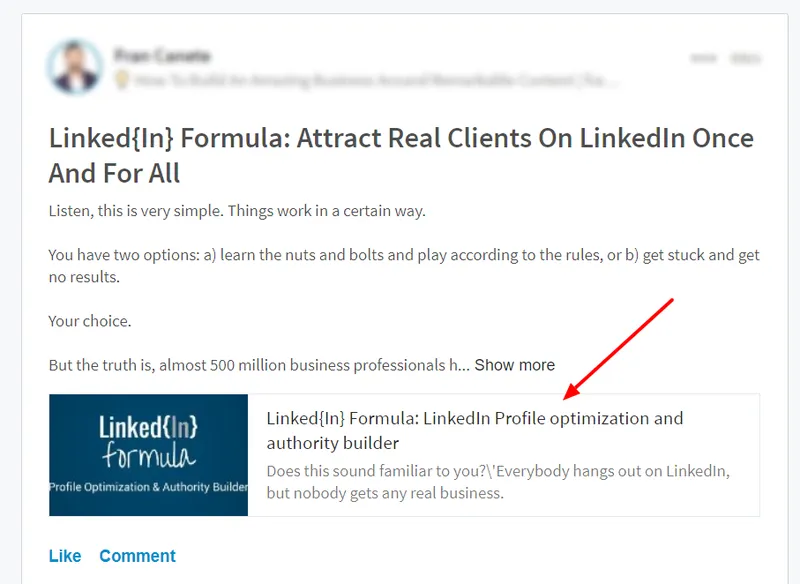
This is a post published on Linkedin, that drives the reader to the landing page.
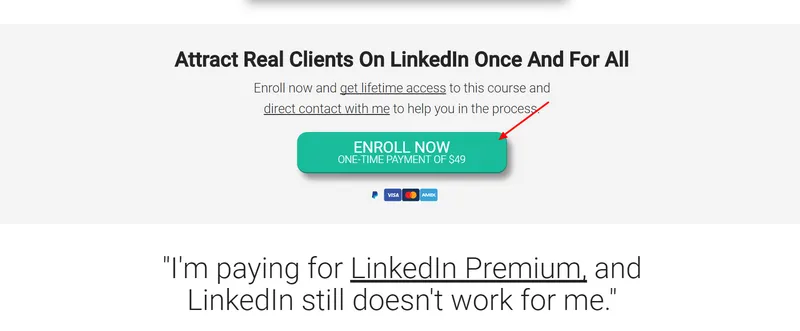
The landing page has a strong copy with a call to actions to drive sales for the course they are selling.
Always keep in mind that the ultimate goal of all the activities that you do is to drive leads in your funnel.
Conclusion
Use all of these content pieces and tactics in tandem to ensure that your overall strategy is integrated, and works well together. Make sure to optimise parts of your content on an ongoing basis from your call to action to your landing page copy to your forms, and your individual offers and media.
Over time, you'll get a clear picture of what helps and what doesn't, which will feed into your ongoing marketing strategy and improve your conversion rates, and in turn generate more leads, profits and revenues for your business.
(Disclaimer: The views and opinions expressed in this article are those of the author and do not necessarily reflect the views of YourStory.)



